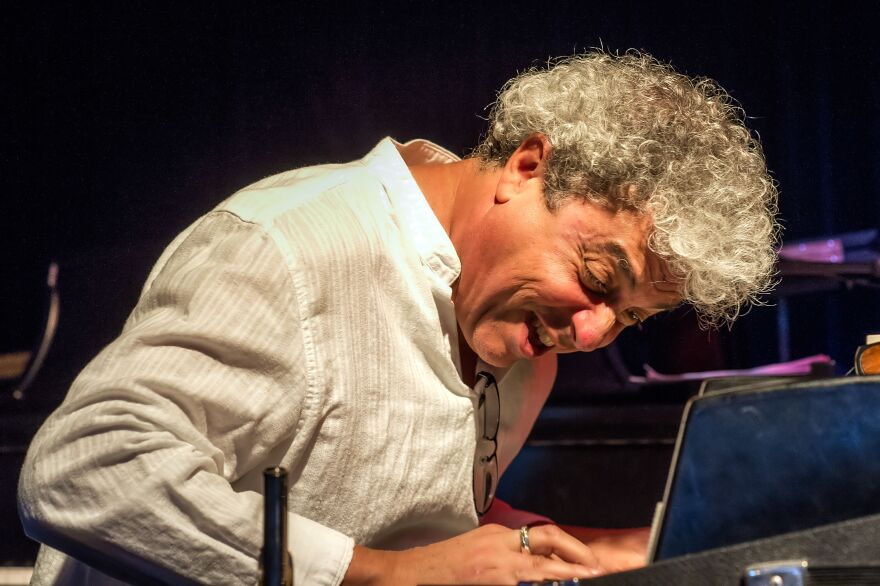“When I left Cornish, it was right in the beginning of the pandemic. Nobody knew what was going to happen," Santos Neto recalls. "Suddenly, everything became a strange new world. I'm very grateful that my fantastic family, my wife and my kids, were very helpful in organizing my next steps."
“In May of 2020, I started teaching these classes, originally on Brazilian music," he continues. "All my classes, in a way, they sort of gravitate around the ideas of Brazilian music, but some are more historical, some are more practical. So there's all kinds.”
Santos Neto's Zoom lectures have wide appeal. They’re lively and entertaining, and there’s interaction with him and the other attendees. He brings joy to learning, as well as expertise.
“I have an average between 20, 30 and 40 people in each class,” says Santos Neto. “And of course, some people take the classes several times, different classes, and some people will take the same class three or four times because they say it's different every time and they enjoy it. So I'm OK with that!”
“It has been a very liberating experience, because I can do it from anywhere," says Santos Neto. "Also, for me, it's a fantastic learning experience, because I'm not just regurgitating something that I learned years ago. It involves a lot of studying to be able to gather all this information, in many different languages, and put it together and then deliver it spontaneously. I have notes, but my notes are only to ground me when I start to go too much off on a tangent, and I look at my notes and it kind of pulls me back to the subject. I think people like that; I’ve been having great feedback.”
Santos Neto's class offerings to date have included the historical overview 500 Years of Brazilian Music and Brazilian Rhythms, The Brazilian Piano, plus a number of listening sessions for specific recordings that he has performed in and/or produced — kind of an insider’s view of the music and the era in which it was recorded.
“The upcoming class was my daughter's suggestion," says Santos Neto. "I wanted to do this thing about 'prohibited' or 'forbidden' music. She even came up with the title: Music As Resistance. That's perfect. And my wife is really good at graphics, she does the logos for my class materials.”
It’s both a timely and an historic topic.
"We're in a time when, not only in the United States but also in Brazil and all over the world, there's once again, a kind of a cyclic thing where people think that only they own the truth," says Santos Neto. "Like, this is my truth and this is your truth. And so people start to equate facts with opinions."
Santos Neto was about 10 years old at the start of Brazil’s military coup. Between 1964 and 1968, civil liberties were crushed, and censorship was rampant.
“So as a musician, a young musician at the age of 15, 16 years old, I had to be registered with the censorship department,” Santos Neto recalls. “Everything you played in a concert had to be submitted ahead of time; the song titles, the lyrics. I remember going to a meeting because they called, and said ‘You have to come in and explain something.’ I wrote some crazy lyrics, I was 15, it was, ‘I want to look beyond the mirror,’ or something like that. And this bureaucrat behind the big desk says, ‘What do you mean by that? You're not talking about the government, are you?’”
There are many more censorship stories, including some from Jovino's friend and mentor Hermeto Pascoal, a musician beyond category and beyond politics.
Known for his inventive use of household objects, Hermeto was forbidden from using cooking pots filled with stones as tuned percussion instruments because the government thought it implied that the people had no food and they had to eat rocks.
“These stories are really fascinating in a way," says Santos Neto. "Stories throughout history, not just from the 1960s, but also the stories that go back to the beginning of the colonization of Brazil and slavery."
"That was such a defining moment," he continues. "Human beings were enslaved, and more slaves were brought to Brazil than to anywhere else in the world, more than 10 times more than to the United States, to work in the sugar plantations, gold mines and coffee plantations.”
"Then of course, there's the counter-story, which is Brazil being such a large, wild, big backyard of a country, and slaves would escape. They would create their own communities, African communities inside of Brazil, called quilombos. Some of them lasted as long as 95 years. People are still discovering the remnants of those independent societies, who were living and trading with the world around them.”
The music associated with these stories of protest and censorship has many different roots — and as many different branches. Songwriters and lyricists figured out clever ways to get their messages heard. Some created alter egos, others used such deep symbolism that only others "in the know" would understand. Some were caught, imprisoned and even tortured.
"It was crazy for artists," Santos Neto recalls. "Not only was it a time of extreme repression, but it was also a time that extreme repression worked as a fertilizer for extreme creativity."
Music As Resistance will be a fascinating class, and you don't have to be a musician to be able to learn from it.
"I'm known as a musician and an educator and a composer," Santos Neto says. "Sometimes people are a little reticent to join a class because they think that there's going to be a lot of musical jargon; I'm suddenly going to be throwing 'flat 13ths' and 'sharp 9ths' all over the place. No. If somebody wants that, then they can have a private class with me, and I will share all the crazy theoretical concepts and more because I love that too."
"But this class is about music made by humans inside of a social, historical and political context," he says. "We'll spend a lot of time listening to music, interpreting the lyrics in that context."
"In some of my previous classes, I was getting a lot of questions about prejudice and racism in Brazil," Santos Neto explains. "Because there's a narrative that 'Brazil is the perfect mix of races; the native, the African and the European.' That's the colonizer's view, but it's much more complex than that. So I tried to get a little bit of everything in this class, but all the music is the center."
Music As Resistance will be four two-hour Zoom sessions, starting March 12. Sessions will be recorded and available online for about a year, along with all course materials.
Jovino Santos Neto's Quinteto plays Seattle's Royal Room on Wednesday, Feb. 23.
Listen for Jovino Santos Neto playing "Ponte Pe" to start Saturday's Jazz Caliente show this week.
Jazz Caliente airs Saturdays at 5 p.m. The show is hosted by Robin Lloyd and produced by KNKX Public Radio.








